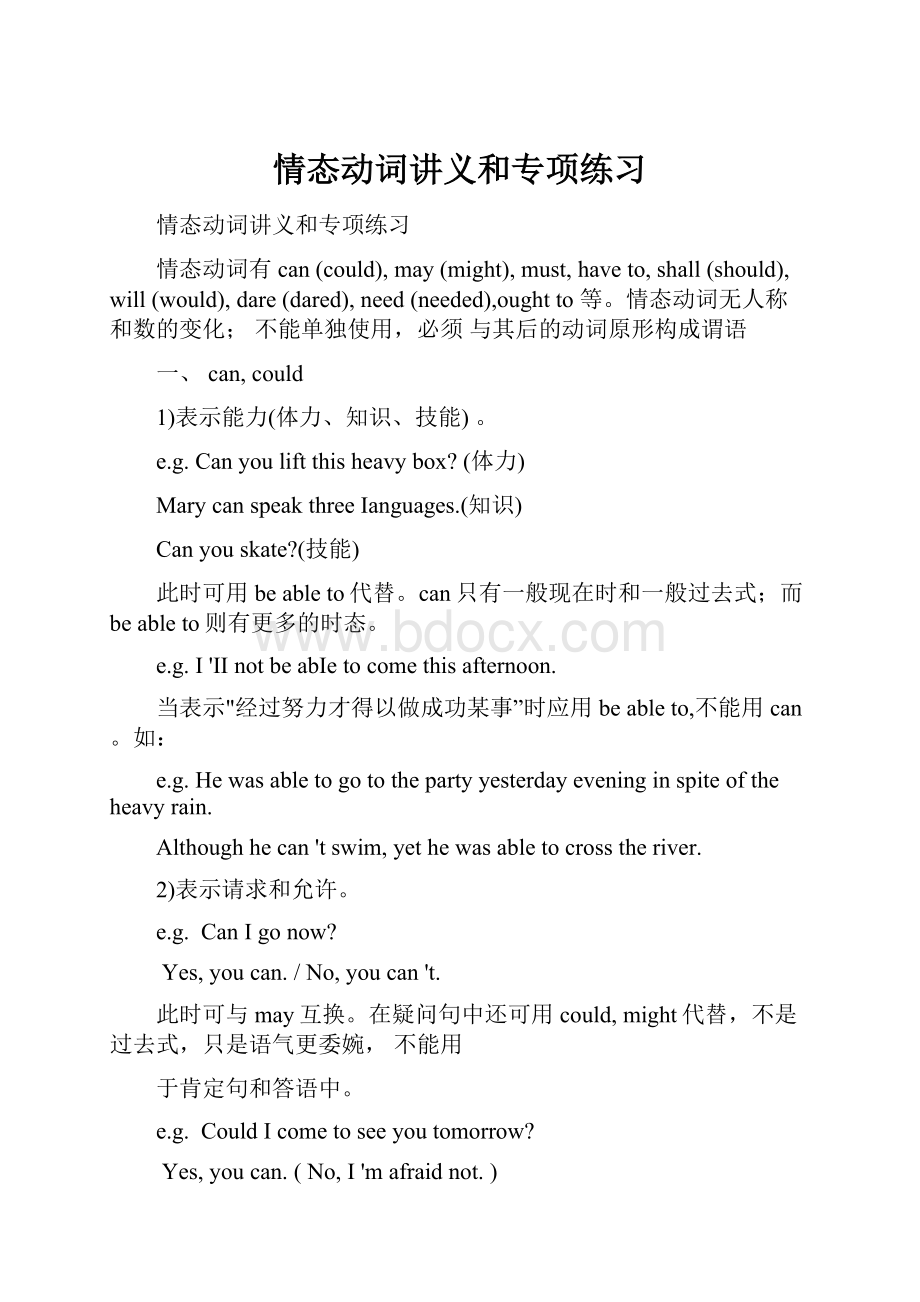情态动词讲义和专项练习.docx
《情态动词讲义和专项练习.docx》由会员分享,可在线阅读,更多相关《情态动词讲义和专项练习.docx(21页珍藏版)》请在冰豆网上搜索。

情态动词讲义和专项练习
情态动词讲义和专项练习
情态动词有can(could),may(might),must,haveto,shall(should),will(would),dare(dared),need(needed),oughtto等。
情态动词无人称和数的变化;不能单独使用,必须与其后的动词原形构成谓语
一、can,could
1)表示能力(体力、知识、技能)。
e.g.Canyouliftthisheavybox?
(体力)
MarycanspeakthreeIanguages.(知识)
Canyouskate?
(技能)
此时可用beableto代替。
can只有一般现在时和一般过去式;而beableto则有更多的时态。
e.g.I'IInotbeabIetocomethisafternoon.
当表示"经过努力才得以做成功某事”时应用beableto,不能用can。
如:
e.g.Hewasabletogotothepartyyesterdayeveninginspiteoftheheavyrain.
Althoughhecan'tswim,yethewasabletocrosstheriver.
2)表示请求和允许。
e.g.CanIgonow?
Yes,youcan./No,youcan't.
此时可与may互换。
在疑问句中还可用could,might代替,不是过去式,只是语气更委婉,不能用
于肯定句和答语中。
e.g.CouldIcometoseeyoutomorrow?
Yes,youcan.(No,I'mafraidnot.)
3)表示客观可能性(客观原因形成的能力)。
e.g.They'vechangedthetimetable,sowecangobybusinstead.
Thishallcanhold500peopleatleast.
4)表示推测(惊讶、怀疑、不相信的态度),用于疑问句、否定句和感叹句中。
e.g.Canthisbetrue?
Thiscan'tbedonebyhim.
Howcanthisbetrue?
5)“can+havedone”主要用于否定句和疑问句中,表示对过去发生的行为怀疑或不肯定。
e.g.Hecannothavebeentothattown.
Canhehavegotthebook?
“could+havedone”表示虚拟语气。
e.g.Butforyourhelp,wecouldn'thavefinishedthetaskbeforethedeadline.
Youcouldhaveachievedbetterresultsbutyouwastedthevaluabletime.
6)习惯用法:
cannottoo"再也不过分”
e.g.Youcannotbetoocarefulinthechoiceofyourfriends.
二、may,might
1)表示请求和允许。
might比may语气更委婉,而不是过去式。
否定回答时可用can't
或mustn',表示"不可以,禁止”。
e.g.Might/MayIsmokeinthisroom?
No,youmustn't.
May/MightItakethisbookoutoftheroom?
Yes,youcan.(No,youcan't/mustn't.)
用MayI...?
征徇对方许可时比较正式和客气,而用CanI...?
在口语中更常见。
2)用于祈使句,表示祝愿。
e.g.Mayyousucceed!
3)表示推测、可能性(表示此意时,不用于疑问句)。
might不是过去式,它所表示的可能性比may小。
e.g.Hemay/mightbeverybusynow.
Yourmothermay/mightnotknowthetruth.
4)“may/might+havedone”表示对过去行为的推测。
e.g.Withouttheheavytraffic,wemighthavecaughtthetrain.
5)习惯用法:
may/mightaswell+do“不妨”
e.g.Youmightaswellhaveananothertry.
三、must,haveto
1)表示必须、必要。
e.g.Youmustcomeintime.
t,don'thaveto
haveto有更
在回答引出的问句时,如果是否定的,不能用mustn't禁止,不准),而用needn'(不必).
e.g.Mustwehandinourexercisebookstoday?
Yes,youmust.
No,youdon'thaveto/youneedn't.
2)must是说话人的主观看法,而haveto则强调客观需要。
must只有一般现在时,
多的时态形式。
e.g.Theplayisn'tinteresting,Ireallymustgonow.
IhadtoworkwhenIwasyourage.
3)表示推测、可能性(只用于肯定的陈述句)
e.g.You'reTom'sgoodfriend,soyoumustknowwhathelikesbest.
Yourmothermustbewaitingforyounow.
表示肯定推测的否定句,用cannot
e.g.Thiscannotbeyourpen.
4)“must+havedone”对过去行为的肯定推测,否定句用cannot.
e.g.Itmusthavebeenrainyyesterday,wasn'tit?
Itmusthaverainedyesterday,didn'tit?
5)havegotto是haveto的口语形式。
e.g.Youhaven'tgottogotoschooltoday,haveyou?
6)must“偏偏”
e.g.WhymustitrainonSunday?
Weweregoingtoseeamovie,butitmustrainyesterday.
四、dare,need
1)dare作情态动词用时,常用于疑问句、否定句和条件从句中,过去式形式为darede.g.HowdareyousayI'munfair?
Hedaren'tspeakEnglishbeforesuchacrowd,darehe?
Ifwedarednotgotherethatday,wecouldn'tgetthebeautifulflowers.
2)need作情态动词用时,常用于疑问句、否定句。
在肯定句中一般用must,haveto,oughtto,should代替。
e.g.Youneedn'tcomesoearly.
NeedIfinishtheworktoday?
Yes,youmust./No,youneedn't.
3)dare和need作实义动词用时,有人称、时态和数的变化。
在肯定句中,dare后面常接带to的不定式。
在疑问句和否定句中,dare后面可接带to或不带to的不定式。
而need后面只能接带to的不定式。
e.g.Idaretoswimacrossthisriver.
Hedoesn'tdare(to)answer.
Heneedstofinishhishomeworktoday.
4)“needn't+havedone表示虚拟语气,本不必做某事而事实上却做了。
e.g.Youneedn'thavewaitedforme.
5)needdoing=needtobedone.
e.g.Thewashingmachineneedsrepairing.=Thewashingmachineneedstoberepaired.
6)"Idaresay”意为"我猜测”
e.g.Idaresayhewillcome.
五、shall,should,oughtto
1)shall用于第一人称,征求对方的意见。
e.g.Whatshallwedothisevening?
2)shall用于第二、三人称,表示说话人给对方的命令、警告、允诺或威胁。
e.g.Youshallfailifyoudon'HWo)khard.(
HeshallhavethebookwhenIfinishit.(允诺)
Heshallbepunished.(威胁)
3)shall用于第一,第三人称疑问句中,表示说话人征求对方的意见或向对方请示。
e.g.Shallwebeginourlesson?
Whenshallwebeabletoleavethehospital?
4)should,oughtto表示“应该”,oughtto表示义务或责任,比should语气重。
e.g.Ishouldhelpherbecausesheisintrouble.
Yououghttotakecareofthebaby.
5)表示劝告、建议和命令。
should,oughtto可通用,但在疑问句中常用should。
e.g.Youshould/oughttogotoclassrightaway.
ShouldIopenthewindow?
6)should表示主观推测,“估计”“按道理应该”
e.g.Heoughtto/shouldbehomebynow.
Theyshouldfinishitbynow.
7)“should+havedone”用于虚拟语气,本应该做某事而实际上并未做某事。
e.g.Youshouldhavearrivedhere5minutesearlier.
8)特殊用法:
“竟然”“居然”表示说话人感到意外,赞叹,愤怒,惊异等感情。
e.g.Youcan'timaginethegentlemanshouldbeathief.
e.g.Idon'tknowwhyyoushouldthinkIdidit.“倒是”,用于第一人称时表示说话人的一种谦逊,客气,委婉的语气。
e.g.Ishouldthinkitwouldbebettertotryitagain.
Ishouldadviseyounottodothat.
六、will,would
1)will表示请求、建议等,would更委婉。
e.g.Will/Wouldyoupassmetheball,please?
2)will表示意志、愿望和决心。
e.g.Iwillneverdothatagain.
Theyaskedhimifhewouldgoabroad.
3)would表示过去反复发生的动作或某种倾向。
would表示过去习惯时比usedto正式,且没有“现
已无此习惯”的含义。
e.g.Duringthevacation,hewouldvisitmeeveryotherday.
Thewoundwouldnotheal.
4)would表示估计和猜想。
e.g.Itwouldbeaboutteno'clockwhenshelefthome.
5)would用在虚拟语气中(参考虚拟语气语法)。
e.g.Ifitshouldrain,thecropwouldbesaved.
七、情态动词+不定式完成式(havedone)
1)can/could+havedone在肯定句中表示“本来可以做而实际上未能做某事”,是虚拟语气;在疑
问句或否定句中表示对过去行为的怀疑或不肯定,表示推测。
e.g.Youcouldhavedonebetter,butyoudidn'ttryyourbest.(虚拟语气)
Hecan'thavebeentothattown.(推测)
Canhehavegotthebook?
(推测)
2)may/might+不定式完成式(havedone)表示对过去行为的推测。
不能用于疑问句中。
might所表示的可能性比may小。
e.g.Hemaynothavefinishedthework..
Ifwehadtakentheotherroad,wemighthavearrivedearlier.
3)must+不定式完成式(havedone)用于肯定句中,表示对过去行为的推测。
意为“一定、想必”。
其疑问、否定形式用can,can't。
can/could+havedone表示推测。
e.g.YoumusthaveseenthefilmTitanic.
HemusthavebeentoShanghai.
4)should+不定式完成式(havedone)用于肯定句中,表示对过去行为的推测。
e.g.Heshouldhavefinishedtheworkbynow。
表示“本应该做而实际上没有做某事”,其否定式表示某种行为本不该发生却发生了。
可以与oughtto+不定式完成式(havedone)互换。
e.g.Yououghtto/shouldhavehelpedhim.(butyoudidn't.)
Sheshouldn'thavetakenawaymymeasuringtape,forIwantedtouseit.5)needn't+不定式完成式(havedone)表示“本来不必做而实际上做了某事”。
e.g.Youneedn'thavewateredtheflowers,foritisgoingtorain.6)will+不定式完成式(havedone)
主要用于第二、三人称,表示对已完成的动作或事态的推测。
e.g.Hewillhavearrivedbynow.
情态动词专项练习
1.Heyoumorehelp,eventhoughhewasverybusy.
A.mighthavegivenB.mightgiveC.mayhavegivenD.maygive
2.Jennyhavekeptherword.Iwonderwhyshechangedhermind.
A.mustB.shouldC.needD.would
3..-CouldIborrowyourdictionary?
-Yes,ofcourseyou
A.mightB.willC.canD.should
4.ItoldSallyhowtogethere,butperhapsIforher.
A.hadtowriteitoutB.musthavewrittenitout
C.shouldhavewrittenitoutD.oughttowriteitout
5.—ShallItellJohnaboutit?
—No,you.I'vetoldhimalready.
A.needn'tB.wouldn'tC.mustn'tD.shouldn't
6.—Therewerealreadyfivepeopleinthecarbuttheymanagedtotakemeaswell.
—Itacomfortablejourney.
A.can'tbeB.shouldn'tbeC.mustn'thavebeenD.couldn'thavebeen
7.It'snearlyseveno'clock.Jackbehereatanymoment.
A.mustB.needC.shouldD.can
8..Whenhewasthere,hegotothatcoffeeshopatthecornerafterwork
everyday.
A.wouldB.shouldC.hadbetterD.might
9..Sir,youbesittinginthiswaitingroom.Itisforwomenandchildrenonly.
A.oughtn'ttoB.can'tC.won'tD.needn't
10.Thefirespreadthroughthehotelveryquicklybuteveryonegetout.
A.hadtoB.wouldC.couldD.wasableto
11.--WhencanIcomeforthephotos?
Ineedthemtomorrowafternoon.
--Theybereadyby12:
00.
A.canB.shouldC.mightD.need
12..--IstayedatahotelwhileinNewYork.
--Oh,didyou?
YouwithBarbara.
A.couldhavestayedB.couldstayC.wouldstayD.musthavestayed
13.—Willyoustayforlunch?
—Sorry,,Mybrotheriscomingtoseeme.
A.Imustn'tB.lcan'tC.Ineedn'tD.Iwon't
14.Sorryrmlate.Ihaveturnedoffthealarmclockandgonebacktosleepagain.
A.mightB.shouldC.canD.will
15.Ishouldhavebeenthere,butInotfindthetime.
A.wouldB.couldC.mightD.should
16.MysistermethimattheGrandTheatreyesterdayafternoon,soheyourlecture.
A.couldn'thaveattendedB.needn'thaveattended
C.mustn'thaveattendedD.shouldn'thaveattended
17.---AreyoucomingtoJeff'sparty?
---I'mnotsure.Igototheconcertinstead.
A.mustB.wouldC.shouldD.might
18.Mr.Bushisontimeforeverything.Howitbethathewaslatefortheopeningceremony?
A.canB.shouldC.mayD.must
19Hehesitatedforamomentbeforekickingtheball,otherwiseheagoal.
A.hadscoredB.scoredC.wouldscoreD.wouldhavescored
20.—Writetomewhenyougethome.
A.ImustB.IshouldC.IwillD.Ican
21.1wasreallyanxiousaboutyou.Youhomewithoutaword.
A.mustn'tleaveB.Shouldn'thaveleftC.Couldn'thaveleftD.needn'tleave
22.Oh,I'mnotfeelingwellinthestomach,Isomuchfriedchickenjustnow.
A.shouldn'cutB.mustn'thaveeatenC.shouldn'haveeatenD.mustn'teat
23.--Iheardtheywentskiinginthemountainslastwinter.
--Itbetruebecausetherewaslittlesnowthere.
AmaynotbeBwon'tbeCcouldn'tbeDmustn'tbe
24.Ithasbeenannouncedthatcandidatesremainintheirseatsuntilallthepapershavebeencollected.
AcanBwillCmayDshall
25.Aleft-luggageofficeisaplace